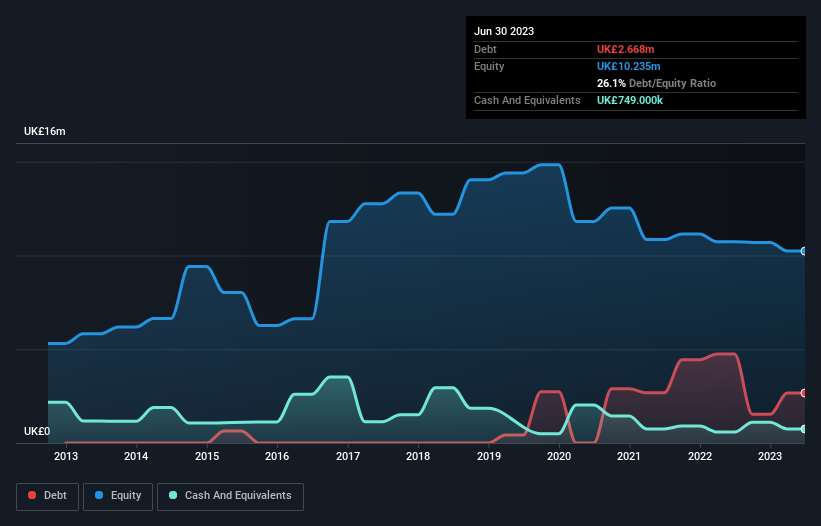- United Kingdom
- /
- Aerospace & Defense
- /
- AIM:PEN
Here's Why Pennant International Group (LON:PEN) Can Afford Some Debt

Legendary fund manager Li Lu (who Charlie Munger backed) once said, 'The biggest investment risk is not the volatility of prices, but whether you will suffer a permanent loss of capital.' It's only natural to consider a company's balance sheet when you examine how risky it is, since debt is often involved when a business collapses. We note that Pennant International Group plc (LON:PEN) does have debt on its balance sheet. But should shareholders be worried about its use of debt?
When Is Debt Dangerous?
Debt and other liabilities become risky for a business when it cannot easily fulfill those obligations, either with free cash flow or by raising capital at an attractive price. If things get really bad, the lenders can take control of the business. However, a more usual (but still expensive) situation is where a company must dilute shareholders at a cheap share price simply to get debt under control. Having said that, the most common situation is where a company manages its debt reasonably well - and to its own advantage. The first step when considering a company's debt levels is to consider its cash and debt together.
See our latest analysis for Pennant International Group
What Is Pennant International Group's Debt?
As you can see below, Pennant International Group had UK£2.67m of debt at June 2023, down from UK£4.74m a year prior. However, because it has a cash reserve of UK£749.0k, its net debt is less, at about UK£1.92m.

How Healthy Is Pennant International Group's Balance Sheet?
The latest balance sheet data shows that Pennant International Group had liabilities of UK£9.66m due within a year, and liabilities of UK£583.0k falling due after that. Offsetting these obligations, it had cash of UK£749.0k as well as receivables valued at UK£4.70m due within 12 months. So its liabilities total UK£4.79m more than the combination of its cash and short-term receivables.
This deficit isn't so bad because Pennant International Group is worth UK£12.2m, and thus could probably raise enough capital to shore up its balance sheet, if the need arose. However, it is still worthwhile taking a close look at its ability to pay off debt. When analysing debt levels, the balance sheet is the obvious place to start. But it is future earnings, more than anything, that will determine Pennant International Group's ability to maintain a healthy balance sheet going forward. So if you're focused on the future you can check out this free report showing analyst profit forecasts.
In the last year Pennant International Group had a loss before interest and tax, and actually shrunk its revenue by 11%, to UK£14m. That's not what we would hope to see.
Caveat Emptor
While Pennant International Group's falling revenue is about as heartwarming as a wet blanket, arguably its earnings before interest and tax (EBIT) loss is even less appealing. To be specific the EBIT loss came in at UK£890k. When we look at that and recall the liabilities on its balance sheet, relative to cash, it seems unwise to us for the company to have any debt. Quite frankly we think the balance sheet is far from match-fit, although it could be improved with time. We would feel better if it turned its trailing twelve month loss of UK£466k into a profit. So in short it's a really risky stock. The balance sheet is clearly the area to focus on when you are analysing debt. But ultimately, every company can contain risks that exist outside of the balance sheet. To that end, you should learn about the 2 warning signs we've spotted with Pennant International Group (including 1 which doesn't sit too well with us) .
If, after all that, you're more interested in a fast growing company with a rock-solid balance sheet, then check out our list of net cash growth stocks without delay.
New: Manage All Your Stock Portfolios in One Place
We've created the ultimate portfolio companion for stock investors, and it's free.
• Connect an unlimited number of Portfolios and see your total in one currency
• Be alerted to new Warning Signs or Risks via email or mobile
• Track the Fair Value of your stocks
Have feedback on this article? Concerned about the content? Get in touch with us directly. Alternatively, email editorial-team (at) simplywallst.com.
This article by Simply Wall St is general in nature. We provide commentary based on historical data and analyst forecasts only using an unbiased methodology and our articles are not intended to be financial advice. It does not constitute a recommendation to buy or sell any stock, and does not take account of your objectives, or your financial situation. We aim to bring you long-term focused analysis driven by fundamental data. Note that our analysis may not factor in the latest price-sensitive company announcements or qualitative material. Simply Wall St has no position in any stocks mentioned.
About AIM:PEN
Pennant International Group
Provides integrated training and support software solutions, products, and services in the United Kingdom, rest of Europe, North America, and Indo-Pacific region.
Good value with moderate growth potential.

